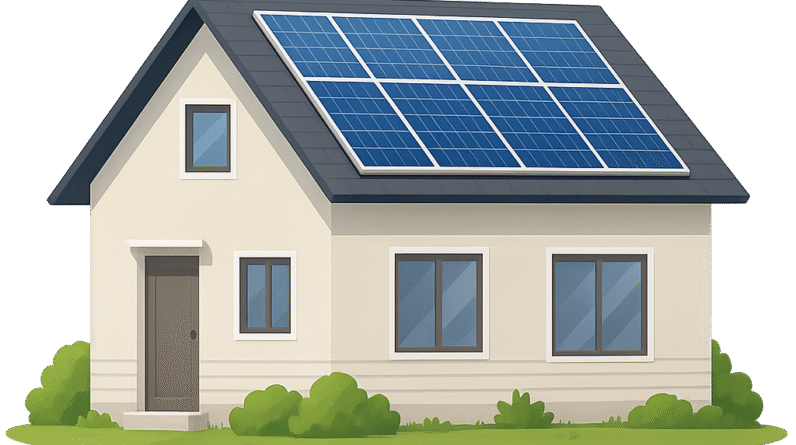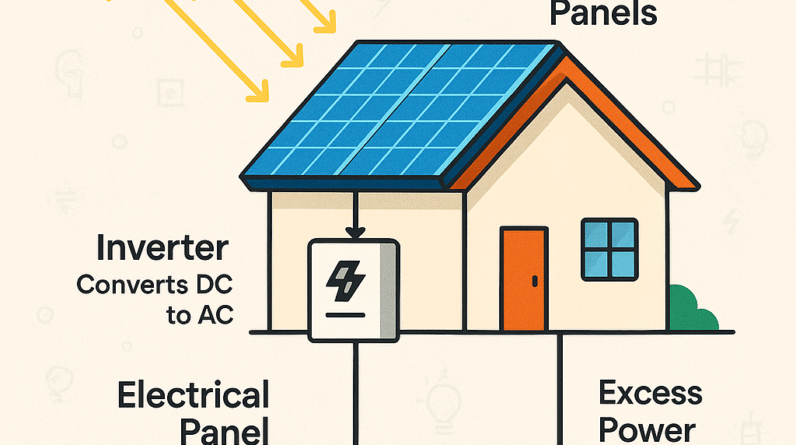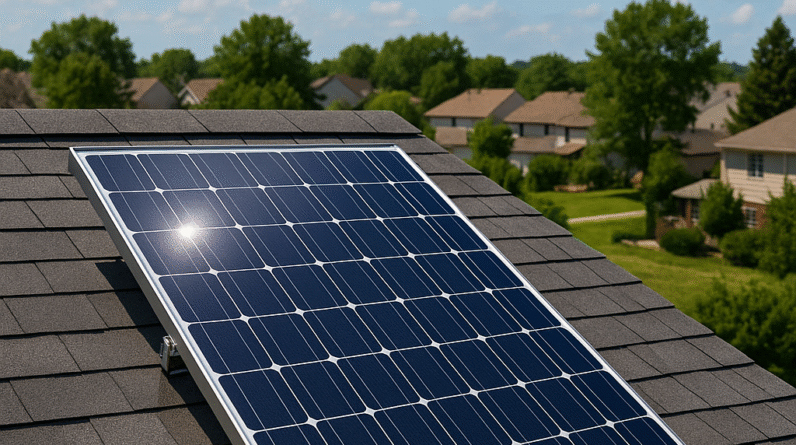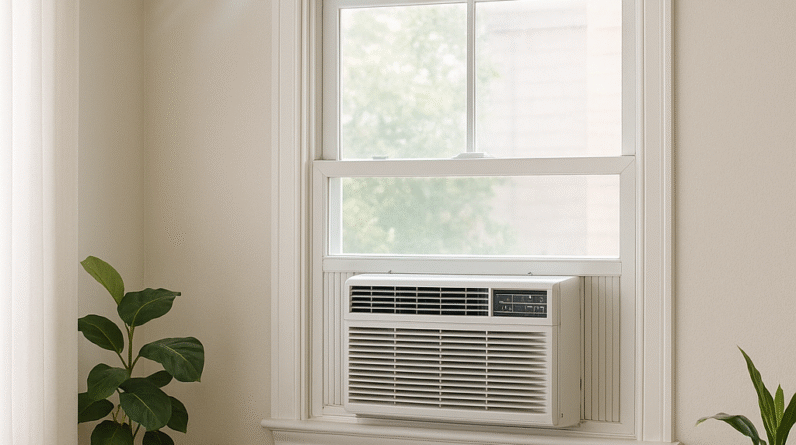
What Happens After I Pay Off My Solar Panels?
What Happens After I Pay Off My Solar Panels? So you’ve finally paid off your solar panels and are wondering what happens next. Well, congratulations on taking a big step towards sustainable energy! Once the last payment is made, you can expect a sense of relief and satisfaction, but that’s not the end of the story. In fact, it’s just the beginning of a whole new chapter in your relationship with solar power. From enjoying decades of free electricity to potentially earning money through net metering, there are numerous possibilities that await you after paying off your solar panels. Let’s explore what lies ahead on this exciting renewable energy journey.
Solar panel ownership
Owning solar panels offers a multitude of long-term benefits that go beyond just saving money on your energy bills. Let’s explore the various advantages of being a solar panel owner.
Long-term benefits
When you invest in solar panels, you’re investing in the future. Not only do solar panels have an average lifespan of 25-30 years, but they also provide a reliable and renewable source of energy for your home. By harnessing the power of the sun, you can significantly reduce your dependence on fossil fuels and contribute to a cleaner, greener environment.
Continued energy savings
One of the most significant benefits of owning solar panels is the potential for continued energy savings. With solar, you can generate your own electricity, which means lower utility bills. As the cost of traditional energy sources continues to rise, your solar panels will continue to provide you with sustainable and cost-effective energy for years to come.
Possible future upgrades
Solar technology is constantly evolving and improving. As advancements are made in the industry, you may have the opportunity to upgrade your solar panel system to take advantage of new features and increased efficiency. Upgrading your system can further enhance your energy savings and help you stay up-to-date with the latest solar innovations.
Maintenance and care
While solar panels require minimal maintenance, it’s important to take proper care of your system to ensure optimal performance and longevity.
Cleaning and inspections
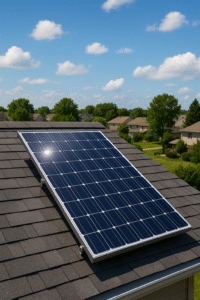
Regularly cleaning your solar panels is essential to maximize their efficiency. Dust, dirt, and debris can accumulate on the surface, reducing their ability to absorb sunlight. A gentle cleaning with water and a soft brush is usually sufficient to keep your panels clean. Additionally, scheduling annual inspections by a professional can help identify any issues and ensure your system is functioning properly.
Monitoring system performance
Monitoring your solar system’s performance is crucial to identify any potential problems or inefficiencies. Many solar panel systems come with built-in monitoring tools that allow you to track energy production and identify any fluctuations or anomalies. By staying on top of your system’s performance, you can address any issues promptly and ensure optimal energy generation.
Replacing components
While solar panels are built to last, some components may require replacement over time. Inverters, for example, typically have a lifespan of 10-15 years. Regular maintenance and working with a reputable solar panel installer can help you identify when components need to be replaced and ensure your system continues to operate at its full potential.
Insurance and warranty
Protecting your solar panel investment is essential, and understanding your insurance and warranty options can provide you with peace of mind.
Insurance coverage
Most homeowners’ insurance policies cover solar panels, but it’s important to review your policy to ensure proper coverage. Solar panels are typically considered part of the dwelling, so they may fall under your existing policy’s coverage for structures. However, it’s best to confirm this with your insurance provider and make any necessary adjustments to your policy to adequately protect your solar panels.
Extended warranties
In addition to the standard manufacturer warranty, you may have the option to purchase an extended warranty for your solar panels. Extended warranties can provide additional coverage for specific components or offer a longer duration of protection. Consider your long-term plans and the overall cost-benefit analysis before deciding on an extended warranty.
Warranty claims
In the rare event of a malfunction or defect, having a valid warranty can provide you with the necessary support to address any issues. Familiarize yourself with the terms and conditions of your warranty and follow the proper procedures for filing a claim. By promptly addressing any warranty-related issues, you can ensure that your solar panels continue to generate clean energy efficiently.
Selling excess energy
Producing more energy than you consume is not only economically beneficial, but it also allows you to contribute to the overall grid and reduce your carbon footprint.
Feed-in tariffs
Feed-in tariffs are mechanisms implemented by some governments to incentivize solar panel owners to sell their excess energy back to the grid. Under these programs, you can receive monetary compensation for the electricity you produce and feed into the grid. By taking advantage of feed-in tariffs, you can not only recoup your initial investment faster but also make a positive impact on the environment.
Net metering
Net metering is another method used to credit solar panel owners for the excess energy they generate. With net metering, any surplus energy your solar panels produce is redirected to the grid, and you receive credits for that energy. These credits can then be used to offset your energy consumption during periods when your panels aren’t generating enough electricity. Net metering allows you to effectively use the grid as a virtual battery and maximize the value of your solar panel system.
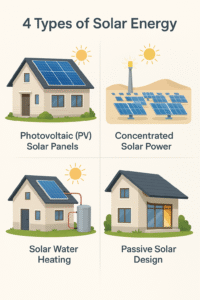
Selling to the grid
In some cases, you may have the option to sell your excess energy directly to the utility company. This can be a beneficial arrangement if the utility company offers competitive rates for solar energy. Selling to the grid not only provides you with an additional revenue stream but also contributes to the overall renewable energy supply in your area.
Choosing to invest in solar panels offers a range of environmental benefits. Let’s explore how solar panel ownership can help reduce your carbon footprint and contribute to a cleaner planet.
Reduced carbon footprint
Solar energy is a clean and renewable source of power. By harnessing the sun’s energy to generate electricity, solar panels produce zero greenhouse gas emissions. Unlike traditional energy sources like coal or natural gas, solar power helps to reduce our reliance on fossil fuels and minimize air pollution. By investing in solar panels, you’re making a significant contribution to mitigating the effects of climate change.
Energy independence
By generating your own electricity through solar panels, you’re no longer solely dependent on the power grid. This energy independence provides you with greater control over your energy consumption and reduces your reliance on external energy sources. Solar panels give you the freedom to generate your own clean energy, even during power outages, ensuring a constant and reliable energy supply for your household.
Positive environmental contribution
Solar panels not only benefit the individual owner but also have a positive cumulative effect when embraced on a larger scale. By collectively adopting solar energy, we can significantly reduce our overall carbon footprint and create a sustainable energy future. Taking the initiative to invest in solar panels contributes to a cleaner environment for future generations.
Although solar panels have a long lifespan, eventually, you will need to consider what to do with them when they are no longer viable for energy production. Let’s explore the various options for end-of-life considerations.
Disposal and recycling
When it comes time to replace your solar panels, proper disposal and recycling are crucial to minimize their impact on the environment. Many components of solar panels, such as glass, aluminum, and silicon, can be recycled and used in the production of new panels. It’s important to work with reputable companies that specialize in recycling solar panels to ensure their proper handling and disposal.
Resale options
While solar panels may no longer be efficient for energy production, they may still hold value for others. Consider exploring resale options, where individuals or organizations interested in utilizing solar panels for non-energy-producing purposes can purchase your used panels. By giving your solar panels a second life, you’re reducing waste and extending their overall environmental impact.
Donating solar panels
Another option for end-of-life solar panels is to donate them to organizations or communities that may benefit from their use. Non-profit organizations, schools, or community centers might welcome the opportunity to incorporate solar panels into their facilities, even if they are no longer generating electricity at optimal levels. Donating your solar panels not only helps others access renewable energy but also promotes a culture of sustainability and environmental stewardship.
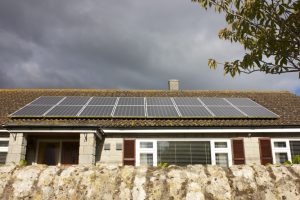
Governments around the world recognize the importance of transitioning to renewable energy sources. Consequently, there are various incentives available to encourage individuals to invest in solar panels.
Tax credits and rebates
Many countries, states, and municipalities offer tax credits and rebates to incentivize the installation of solar panels. These financial incentives can significantly offset the initial cost of purchasing and installing solar panels, making them more accessible and affordable. Research the available tax credits and rebates in your area, as they may vary depending on your location and the specific program requirements.
Incentives for solar panel owners
In addition to tax credits and rebates, some governments offer additional incentives specifically tailored to solar panel owners. These incentives may include grants, low-interest loans, or other financial programs aimed at supporting the adoption of solar energy. These incentives can further enhance the overall financial benefits of owning solar panels and help make renewable energy a viable option for more individuals and communities.
Updating policies and benefits
As the solar industry continues to progress, governments are constantly updating and refining their policies and benefits to support renewable energy adoption. It’s important to stay informed about any changes or new programs being introduced that could further enhance the financial incentives and overall feasibility of solar panel ownership. Regularly checking with local government agencies and professional organizations can ensure you’re taking full advantage of all available benefits.
Investing in solar panels provides numerous financial benefits that go beyond just savings on your energy bills. Let’s explore how solar panel ownership can positively impact your finances.
Decrease in utility bills
One of the primary financial benefits of solar panel ownership is the decrease in your utility bills. By generating your own electricity, you significantly reduce your dependence on the grid, resulting in substantial savings over time. The money you save on energy bills can be allocated towards other expenses or long-term investments, providing you with greater financial flexibility.
Return on investment
Investing in solar panels is not only an environmentally conscious decision but also a smart financial investment. While the upfront cost may be significant, the long-term return on investment can be substantial. Through energy savings and potential incentives, you can recoup your initial investment over time and continue to enjoy the financial benefits of solar panel ownership for years to come.
Increase in property value
Solar panels add value to your property. As renewable energy becomes more popular and sought after, potential homebuyers recognize the benefits of owning solar panels. Studies have shown that homes with solar panels sell for a premium compared to homes without them. This means that your solar panel investment not only pays for itself over time but can also increase the overall value of your property if you decide to sell in the future.
System maintenance and support
Ensuring proper maintenance and having access to reliable support are essential for the smooth operation of your solar panel system.
Manufacturer support
When you purchase solar panels, it’s crucial to choose a reputable manufacturer that offers reliable support and assistance. Manufacturers often provide warranty coverage, technical support, and resources for maintenance and troubleshooting. By purchasing from a trusted manufacturer, you can have peace of mind knowing that you have access to professional assistance if any issues arise.
Local installation companies
In addition to manufacturer support, local installation companies can play a key role in maintaining and supporting your solar panel system. These companies often offer maintenance packages that include regular inspections, cleaning, and system optimization. Engaging with a local installation company ensures that you have access to trained professionals who are familiar with the specific needs and requirements of solar panel systems in your area.
For additional support and knowledge sharing, joining solar panel community forums can be highly beneficial. These online platforms allow you to connect with other solar panel owners, share experiences, and seek advice on maintenance and troubleshooting. Being part of a supportive community can provide you with valuable insights, tips, and solutions to common solar panel-related challenges.
Future of solar energy
The future of solar energy is bright, with ongoing advancements and innovations that will continue to revolutionize the industry.
Advancements in technology
Solar panel technology continues to evolve rapidly. Advancements in efficiency, durability, and aesthetics are constantly being made, making solar panels more accessible and appealing to a wider audience. Emerging technologies, such as thin-film solar panels and solar roof tiles, offer new possibilities for integrating solar energy into our daily lives seamlessly.
Integration with smart homes
The integration of solar energy with smart home technology is becoming increasingly prevalent. Smart home systems can optimize energy consumption, storage, and distribution, allowing you to make the most of your solar panel system. By seamlessly integrating your solar panels with smart home technology, you can further enhance your energy savings and overall efficiency.
The development of solar panel storage solutions is a game-changer in the solar industry. By storing excess energy generated during the day, you can ensure a continuous and reliable energy supply even when the sun isn’t shining. Battery storage systems, such as lithium-ion batteries, are becoming more affordable and efficient, opening up new possibilities for solar panel owners to achieve true energy independence.
In conclusion, owning solar panels offers a wide range of benefits that extend beyond immediate energy savings. From long-term financial advantages to positive environmental contributions, your investment in solar panels is a step towards a more sustainable and efficient future. By taking care of your system, understanding your insurance and warranty options, and exploring opportunities to sell excess energy, you can maximize the value of your solar panel ownership. As the solar industry continues to advance, the future holds exciting possibilities for even greater energy savings, integration with smart home technology, and storage solutions. So, why wait? Start reaping the benefits of solar panel ownership today and join the growing community of environmentally-conscious individuals who are shaping the future of energy.


